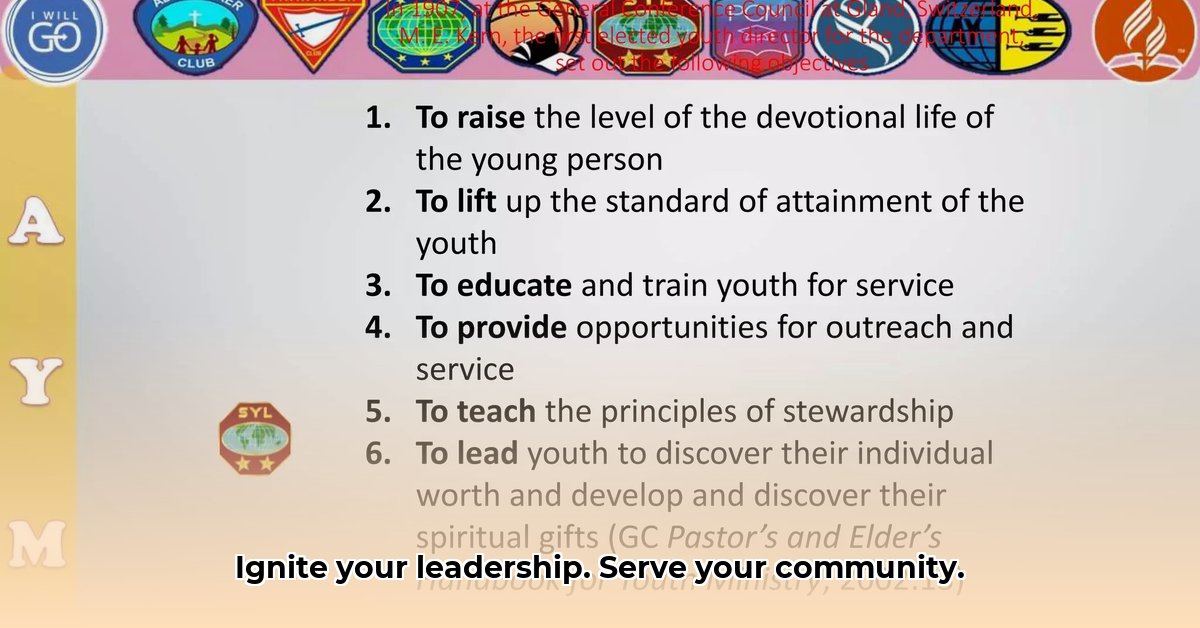
Shaping Lives, One Act of Kindness at a Time
Imagine a young person, previously shy and unsure, blossoming into a confident leader, volunteering at a local clinic and mentoring younger children. This is the transformative power of Adventist Youth Ministry (AYM) in South Africa. It's more than just Sunday school; it's about nurturing faith, developing leadership skills, and fostering a strong sense of community. It's about equipping young people to make a real difference, tjot!
A Multi-pronged Approach: Reaching Out in Many Ways
AYM employs a multifaceted strategy to engage youth. It's not a one-size-fits-all approach; rather, a dynamic system of programs designed to cater to diverse interests and needs.
The Teen Leadership Training program, for instance, empowers young people with essential skills for effective leadership – communication, teamwork, conflict resolution, and decision-making. These aren't just classroom exercises; they're practical life skills applicable far beyond the church walls. Then there's the extensive community service component: from assisting at local festivals to participating in international mission trips, young people gain invaluable real-world experience, building character and a strong sense of purpose. "These aren't just activities," says Pastor Thabo Molefe, Youth Director at the Durban Central Seventh-day Adventist Church, "they are life-shaping experiences that build character and forge lasting memories."
Other initiatives, such as the “Bible Bootcamp” and “One-Night of Power” events, focus on spiritual growth and fellowship. These initiatives have proven surprisingly effective in strengthening young people’s faith and connecting them to their community.
Isn't it incredible to see the positive impact of AYM's dedication to holistic development? Do we have the capacity to expand these impactful programs even further?
Connecting with the Community: Building Bridges
AYM's influence extends far beyond individual growth. Community involvement is key. It fosters a sense of belonging, bridging the gap between the church and the wider community, creating positive and tangible change. It’s about active citizenship and contributing to societal well-being.
Think of the countless hours spent volunteering, the friendships formed, and the ripple effects of community projects. This holistic approach is what sets AYM apart.
Planning for the Future: Sustaining Our Impact
The future of AYM hinges on continuous improvement. The organization regularly assesses its programs, gathers feedback, and adapts to the evolving needs of youth. This includes exploring new avenues to reach a wider audience, leveraging social media, and collaborating with other youth organizations. Strengthening existing partnerships and forging new ones with community leaders will secure the ministry's long-term sustainability and impact.
Measuring Success: It's More Than Just Numbers
While quantitative data is valuable, AYM's success is best measured in the positive transformations witnessed in young people's lives. We see increased self-confidence, improved problem-solving skills, a strengthened sense of purpose, and a deepening commitment to service. These qualitative changes are equally – if not more – important than numerical metrics.
Key Takeaways:
- AYM's programs foster faith, leadership, and community engagement.
- A multi-faceted approach to impact measurement combines quantitative and qualitative data.
- Effective leadership is vital for the success of AYM's initiatives.
How to Measure the Impact of Adventist Youth Ministry Programs
1. Short-Term Wins (1 year or less): Track attendance, observe participant engagement, and analyze feedback questionnaires. Increase in volunteer participation in church activities also showcases short-term impact.
2. Long-Term Impact (3-5 years): Assess the ongoing strength of relationships formed, continued involvement in church activities, leadership roles, and community engagement among past participants. Longitudinal studies and follow-up surveys would provide valuable insight.
3. The Power of Leadership: Evaluate the quality of leadership provided, assessing the leaders' ability to create supportive and inclusive environments. Investment in leadership training significantly enhances program effectiveness.
4. Data-Driven Approach: Combine quantitative data (attendance, surveys) with qualitative data (observations, testimonials, interviews) for a comprehensive understanding of the program's influence.
5. Resource Allocation: Ensure sufficient financial, human, and material resources, including ongoing support from church administration, are provided to facilitate program success.
This isn't just a program; it's a movement shaping lives and building a brighter future for South Africa's youth. It's a journey worth supporting.